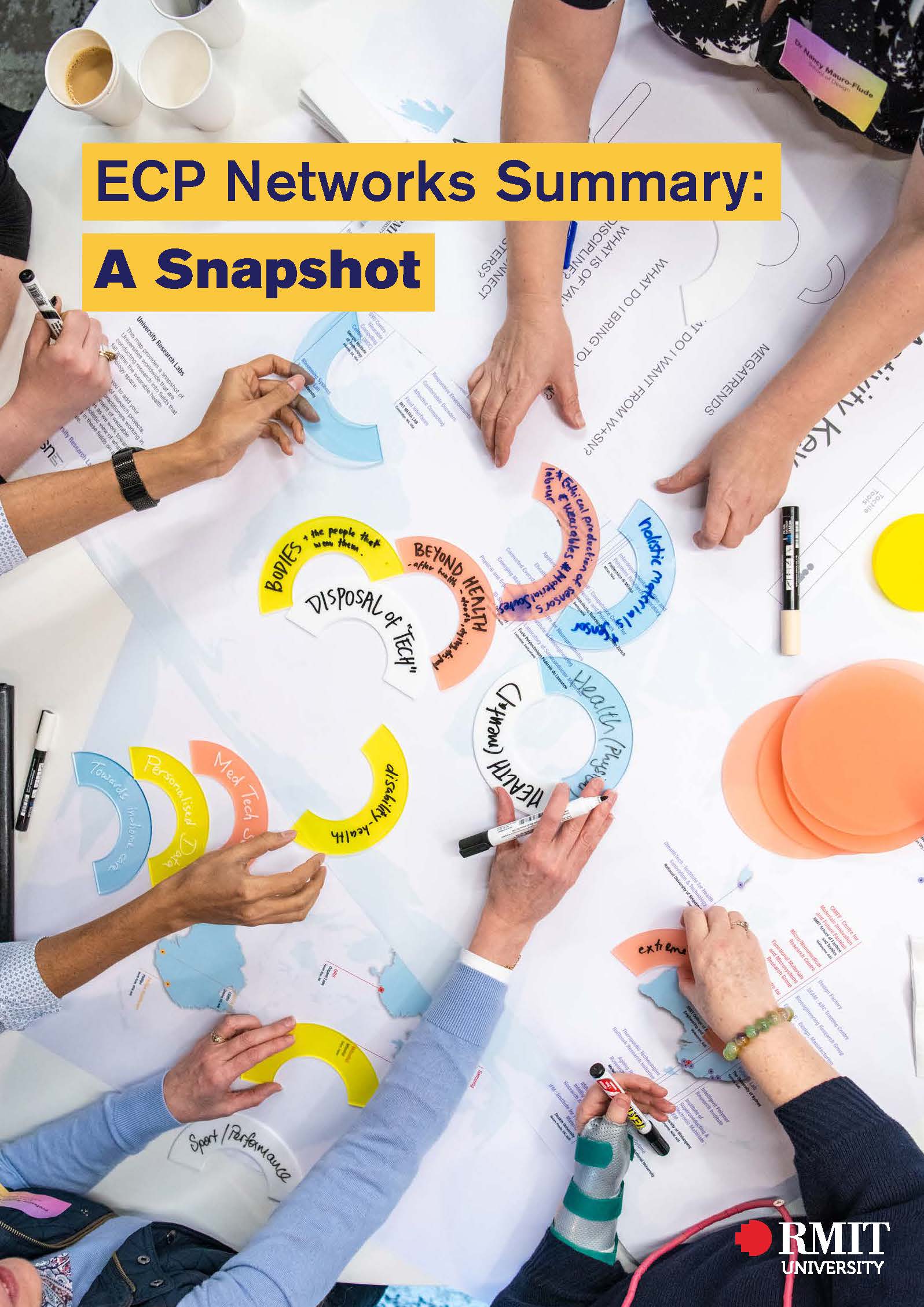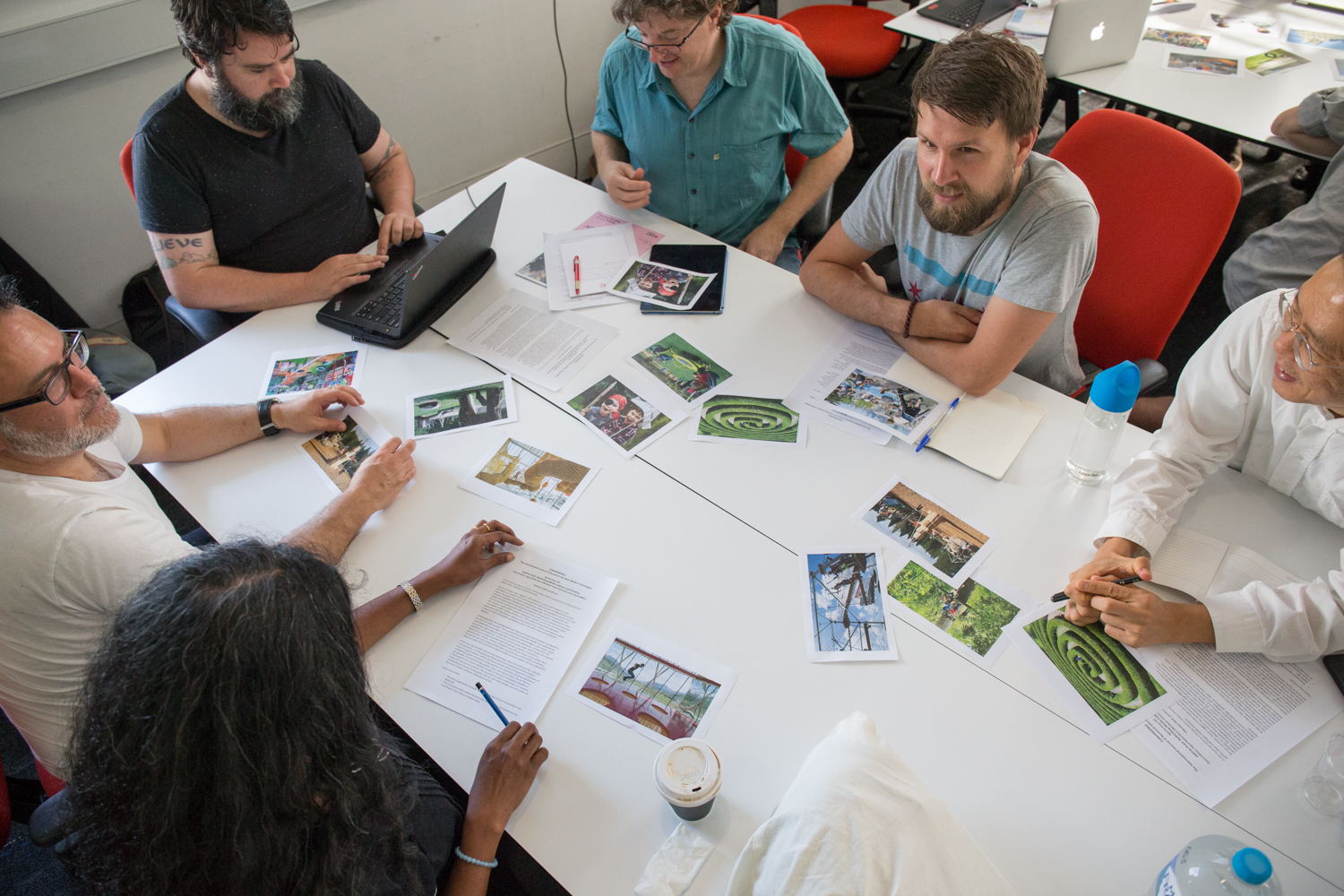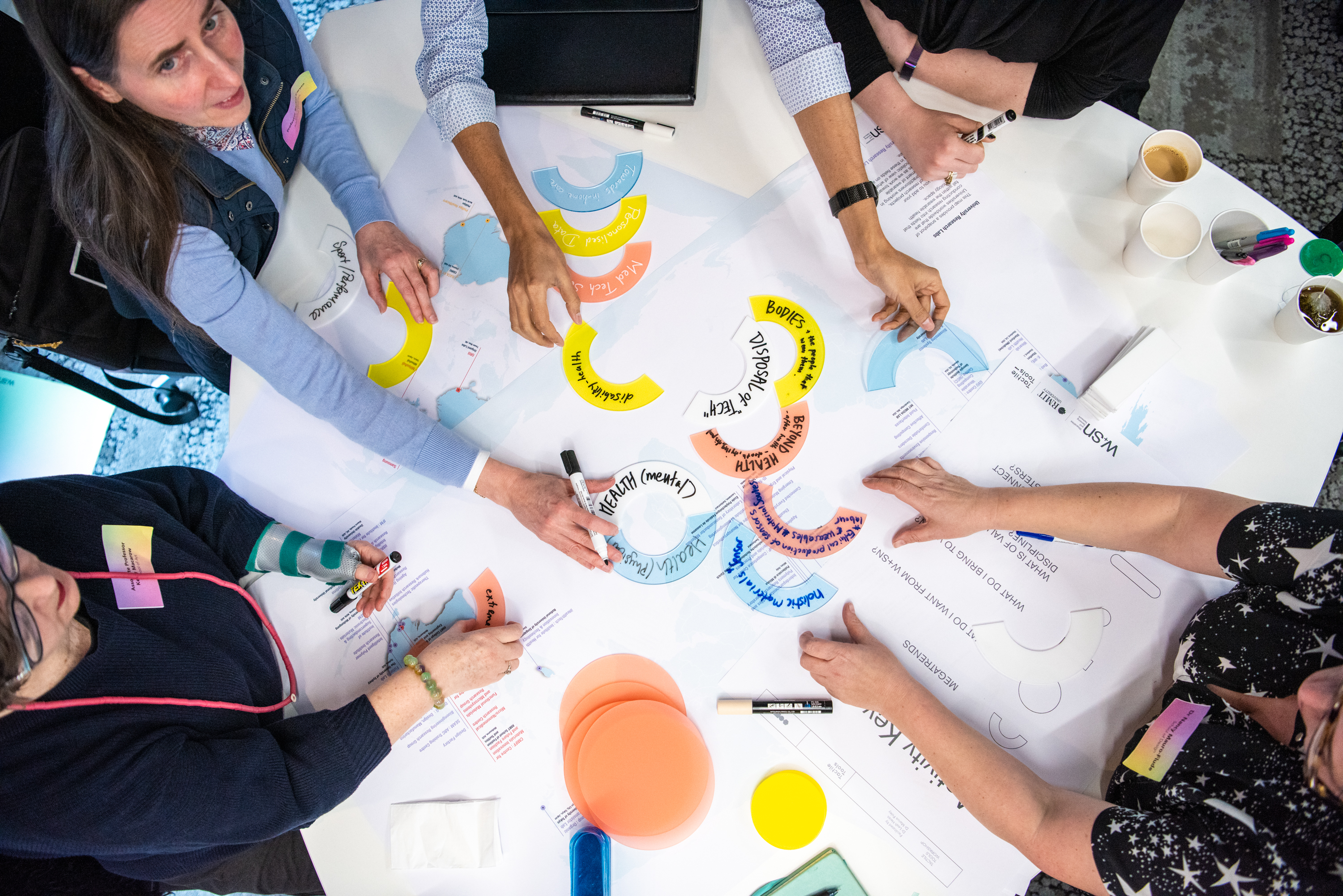Networks
ECP Networks – 2021 Summary Report
August 2021

The networks encapsulate the spirit of the ECPs — demonstrating how the ECPs support building sustainable interdisciplinary collaboration (internal and external) for impactful research.
The networks’ impact expands beyond more than just traditional outputs (grants, articles) to ongoing collaboration with aligned partners. It is about creative and innovative research translation. Many of the networks are run by early career researchers (ECR) and foster collaboration not only across disciplines but career trajectories. We have networks at different scale and depth in response to existing and future orientated real-world problems.
The following 5 page summary report outlines the ECP Network ecosystem, highlighting a series of networks including:
— Bioinformatics Network
— Wearables and Sensing Network
— Australian Maritime Logistics Research Network
— Health, Arts Social sciences and Humanities Network
— Theoretical and Computational Modelling Network
— Space and Spatial Capability Cluster @RMIT
If you would like to get involved with this project, fill out the form below or reach out to project leaders via the contact info provided alongside each bio.
CAD Network
Creative Art & Design Network

The creative arts and design academies are in constant transition. Globally, frameworks and metrics have moved towards advocacy — i.e. acknowledging design and creative practice’s significance across social, cultural and educational areas of impact. Some of these transformations in how we design techniques, translation and knowledge transmission are being taken up by research councils — especially in the UK, Canada and Australia.
The Creative Arts & Design (CAD) network seeks to coalesce and respond to the various ways in which national and international frameworks are being used to articulate the value of the creative arts and design (CAD) — especially around social and cultural impact. As two of the hardest things to “measure” social and cultural impact are often key to CAD approaches — the ways in which industry codesign and engagement starts at the beginning of a project, the ways methods are borrowed from social science and adapted in responsive ways (i.e. creative practice ethnographies), the ways in which pathways and modes for implementation are co-futured into the research design in an iterative way.
We are at a crucial time for reflection and seeing how we might move forward productively to design critical techniques, modes of translations and knowledge transmissions that acknowledge and enhance the particular ways in which CAD areas can co-future impactful research. There is a need to coalesce the different approaches and think about what is working, what isn’t, and what is missing.
NETWORK PUBLICATIONS
- Creative Methods for Impact Policy Brief — May 2020
- CAD Impact Network Workshop Report — June 2019
- Cultural Impact and Value Literature Review — May 2019
If you would like to get involved with this project, fill out the form below or reach out to project leaders via the contact info provided alongside each bio.
Design for Social Innovation (DSI) Network
Using design principles to understand and respond to real world challenges

The Design for Social Innovation Network (DSI) at RMIT responds to the pressing social, environmental, and technical issues of our times with researchers who collaboratively contribute on designs for social innovation that are effective in navigating our future by tackling issues of sustainability, health, technology, and social exclusion of vulnerable people.
NETWORK PUBLICATIONS
If you would like to get involved with this project, fill out the form below or reach out to project leaders via the contact info provided alongside each bio.
People
Yoko Akama
Associate Professor, Communication Design Cluster
School: Communication Design
+61 3 9925 2805
RMIT staff profile
yoko.akama@rmit.edu.au
Yoko Akama is a design researcher at RMIT University, Australia. She co-leads the Design and Social Innovation in Asia-Pacific network and Design+Ethnography+Futures research program at RMIT.
Her Japanese heritage has embedded a Zen-informed relational practice to carve a ‘tao’ (path) in design and has published extensively on this topic. This practice is shaped by working with regional communities in Australia in strengthening their resilience for disaster preparedness, and with Indigenous Nations enact their sovereignty and self-determination. She is an Adjunct Fellow of a ecosystem innovation studio, Re:public Japan, and Visiting Fellow at the Centre of Excellence in Media Practice, Bournemouth University. She serves on several editorial boards of international journals, and conference review committees. She is a recipient of several major research grants in Australia and the UK and winner of the prestigious Good Design Australia Awards in 2014.
Marnie Badham
Senior Research Fellow/ Senior Lecturer
School: School of Art
With a twenty-five-year history of art and social justice practice Australia and Canada, Marnie’s research sits at the intersection of socially engaged art, community-based research methodologies and the politics of cultural measurement. Marnie is currently focused on a series of creative cartographies registering emotion in public space; expanded curation projects on the aesthetics and politics of food; and a book project The Social Life of Artist Residencies: connecting with people and place not your own. Marnie is Senior Research Fellow at the School of Art following the prestigious award of Vice Chancellor’s Postdoctoral Research Fellow at RMIT University. Marnie co-leads the Cultural Value Impact Network and is acting Leader for CAST Contemporary Art and Social Transformation research group.
Laurene Vaughan
Professor and Dean
School: School of Design
Professor Laurene Vaughan is Dean of the School of Design at RMIT. She is internationally recognised as a leader in interdisciplinary and applied design research and pedagogy. Professor Laurene Vaughan has a diverse research and teaching practice covering the areas of design, communication, fashion and embedded research in diverse industry sectors. Laurene currently also contributes to the University research community through being a Research Leader in the RMIT Design Research Institute.
HASH Network
Health, Arts, Social sciences and Humanities Network

The Humanities, Arts, Social sciences and Health (HASH) Network is an interdisciplinary network which brings together health, arts, social sciences, humanities, design, and science and technology. In order to set a transformative and creative agenda for health research in the 21st century, HASH aims to ignite creative connections and collaborations among its members and explore and respond to real-world health issues. The network’s members include academics, professionals, students and community members across diverse disciplines and interests.
HASH’s approach focuses on open dialogue aimed at developing innovative approaches to contemporary health concerns and advancing inquiry in interdisciplinary health research and practice. The network provides a space for people to share ideas, present their work and discuss pressing topics of research methods and theory, impact and engagement, and professional and creative practice.
Publications & Reports
Key Researchers
Renata Kokanovic (Convenor), Natalie Hendry (Convenor), Jacinthe Flore, Tania Lewis, Anna Urbanowicz, Cameron Duff, Monica Barratt, Jonathan Duckworth, Keely Macarow.
Upcoming Events & Projects
- The Big Anxiety Festival, Melbourne 2022, RMIT and UNSW collaboration
HASH is supported by the Design & Creative Practice and Social Change Enabling Capability Platforms.
If you would like to get involved with this project, fill out the form below or reach out to project leaders via the contact info provided alongside each bio.
People
Renata Kokanovic
Convener, The HEALTH Network; Professor
School: Global, Urban & Social Studies
Professor Renata Kokanovic’s works at the intersections of health, society and medicine, with a particular focus on interdisciplinary mental health research.She combines empirical research with interdisciplinary theoretical and methodological scholarship while collaborating with industry partners and health care users to facilitate greater understanding of lived experiences of health and illness.
She co-founded Healthtalk Australia, a digital repository of health and illness narrative accounts designed to support people experiencing ill health, and inform health and social care delivery and policy.
W + SN
Wearables & Sensing Network

Wearables and Sensing Network (W+SN) coalesces cross-disciplinary clusters to develop work that is technologically and aesthetically world-leading.
We combine expertise in nanoscale computer architecture, conductive materials, mechanical engineering, IoT systems and wearable sensors with cutting edge design thinking, co-design, product design and business knowledge. We are reframing how wearable and sensing technologies have been traditionally developed – privileging a technology push approach – by applying Human Centred Design principals to high impact social, health and environmental issues.
Our members traverse twelve University Schools and are passionate about working collaboratively across disciplines and have a track record of interdisciplinary engagement.
Publications & Reports
Key Researchers
Judith Glover, Keely Macarow, Marius Foley, Emma Luke, Soumitri Varadarajan, Thomas Penny, Troy Innocent, Nancy Mauro-Flude, Darrin Verhagen, Jonathan Duckworth, Rohit Ashok Khot, Pia Interlandi, Robyn Healy, Renata Kokanovic
If you would like to get involved with this project, fill out the form below or reach out to project leaders via the contact info provided alongside each bio.
